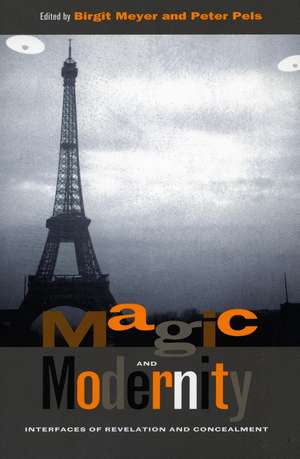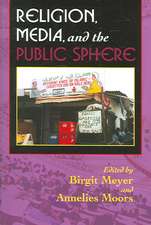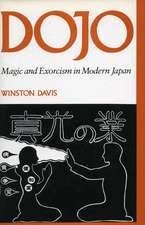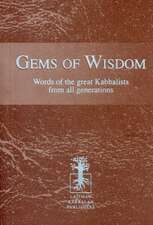Magic and Modernity: Interfaces of Revelation and Concealment
Editat de Birgit Meyer, Peter Pelsen Limba Engleză Hardback – 18 iun 2003
Magic and Modernity is the first book to explore comparatively how magic—usually portrayed as the antithesis of the modern—is also something that is at home in modernity. "Magic" and "modernity" are rarely regarded as belonging together. Evolutionism regarded magic as quintessentially "unmodern." Although psychologists and romantic artists have sometimes declared magic to be a human universal, few modern scholars in the humanities and social sciences have studied how modern culture and institutions incorporated and even produced magic.
This book is the first to adopt a comparative approach to the study of magic as something that has a place in modernity, and that helped to constitute modern society at local and global levels. The essays in this collection contribute to recent discussions in anthropology, cultural studies, comparative literature, history, and sociology that increasingly question the extent to which modern self-conceptions are accurate reflections of a state of affairs in the world rather than cultural interventions.
This book is the first to adopt a comparative approach to the study of magic as something that has a place in modernity, and that helped to constitute modern society at local and global levels. The essays in this collection contribute to recent discussions in anthropology, cultural studies, comparative literature, history, and sociology that increasingly question the extent to which modern self-conceptions are accurate reflections of a state of affairs in the world rather than cultural interventions.
| Toate formatele și edițiile | Preț | Express |
|---|---|---|
| Paperback (1) | 215.28 lei 3-5 săpt. | |
| Stanford University Press – 18 iun 2003 | 215.28 lei 3-5 săpt. | |
| Hardback (1) | 728.41 lei 6-8 săpt. | |
| Stanford University Press – 18 iun 2003 | 728.41 lei 6-8 săpt. |
Preț: 728.41 lei
Preț vechi: 945.98 lei
-23% Nou
Puncte Express: 1093
Preț estimativ în valută:
139.39€ • 144.65$ • 116.51£
139.39€ • 144.65$ • 116.51£
Carte tipărită la comandă
Livrare economică 17-31 martie
Preluare comenzi: 021 569.72.76
Specificații
ISBN-13: 9780804744638
ISBN-10: 0804744637
Pagini: 400
Dimensiuni: 152 x 229 x 33 mm
Greutate: 0.69 kg
Ediția:1
Editura: Stanford University Press
Colecția Stanford University Press
ISBN-10: 0804744637
Pagini: 400
Dimensiuni: 152 x 229 x 33 mm
Greutate: 0.69 kg
Ediția:1
Editura: Stanford University Press
Colecția Stanford University Press
Recenzii
"[Magic and Modernity] is an important introduction and contribution to the anthropological side of this field,"—Magic, Ritual & Witchcraft
"These essays demonstrate that even our most objective categories of social and cultural understanding are entangled in the constitutive undergrowth of our present circumstances. In their diverse and intriguing ways, they are all concerned with the modernist configuration of magic, as magic, so taken, configures modernism. Despite our liberal claims to transparency, reason, and secularism, they lay bare a world shaded by opacity, unreason, and blinkered faith." —Vincent Crapanzano,City University of New York
Notă biografică
Birgit Meyer is a senior lecturer at the Research Centre for the Study of Religion and Society, Department of Sociology and Anthropology, University of Amsterdam. Peter Pels teaches at the Research Centre for the Study of Religion and Society and the Department of Sociology and Anthropology of the University of Amsterdam. He is also the editor of Social Anthropology/Anthropologie Sociale.
Textul de pe ultima copertă
“This volume offers an innovative and intriguing collection of essays. Each chapter is grounded in detailed anthropological and historical research and offers stimulating theoretical considerations. The breadth of scholarship—addressing both the general implications of ‘magic’ and its place in the making of ‘modernity,’ as demonstrated in a range of ethnographic contexts—suggest a broad readership.” —Brad Weiss,The College of William & Mary
“These essays demonstrate that even our most objective categories of social and cultural understanding are entangled in the constitutive undergrowth of our present circumstances. In their diverse and intriguing ways, they are all concerned with the modernist configuration of magic, as magic, so taken, configures modernism. Despite our liberal claims to transparency, reason, and secularism, they lay bare a world shaded by opacity, unreason, and blinkered faith.” —Vincent Crapanzano,City University of New York
“These essays demonstrate that even our most objective categories of social and cultural understanding are entangled in the constitutive undergrowth of our present circumstances. In their diverse and intriguing ways, they are all concerned with the modernist configuration of magic, as magic, so taken, configures modernism. Despite our liberal claims to transparency, reason, and secularism, they lay bare a world shaded by opacity, unreason, and blinkered faith.” —Vincent Crapanzano,City University of New York
Descriere
This is the first book to explore comparatively how magic—usually portrayed as the antithesis of the modern—is also at home in modernity.












